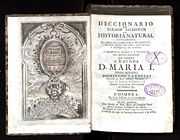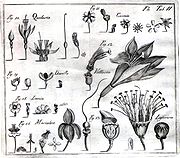
Domenico Vandelli
Encyclopedia


Padua
Padua is a city and comune in the Veneto, northern Italy. It is the capital of the province of Padua and the economic and communications hub of the area. Padua's population is 212,500 . The city is sometimes included, with Venice and Treviso, in the Padua-Treviso-Venice Metropolitan Area, having...
, July 8, 1735 - Lisbon
Lisbon
Lisbon is the capital city and largest city of Portugal with a population of 545,245 within its administrative limits on a land area of . The urban area of Lisbon extends beyond the administrative city limits with a population of 3 million on an area of , making it the 9th most populous urban...
, June 27, 1816) was an Italian
Italy
Italy , officially the Italian Republic languages]] under the European Charter for Regional or Minority Languages. In each of these, Italy's official name is as follows:;;;;;;;;), is a unitary parliamentary republic in South-Central Europe. To the north it borders France, Switzerland, Austria and...
naturalist
Natural history
Natural history is the scientific research of plants or animals, leaning more towards observational rather than experimental methods of study, and encompasses more research published in magazines than in academic journals. Grouped among the natural sciences, natural history is the systematic study...
, who did most of his scientific work in Portugal.
He studied at the University of Padua
University of Padua
The University of Padua is a premier Italian university located in the city of Padua, Italy. The University of Padua was founded in 1222 as a school of law and was one of the most prominent universities in early modern Europe. It is among the earliest universities of the world and the second...
, from which he received a doctorate in Natural Philosophy and Medicine in 1756. While active as naturalist in Italy he began a correspondence with the Swedish naturalist Carl von Linné, which continued for several years. In 1763 he was invited by Catherine the Great of Russia to join the faculty of the University of St. Petersburg, but he declined.
In 1764 Vandelli moved to Portugal
Portugal
Portugal , officially the Portuguese Republic is a country situated in southwestern Europe on the Iberian Peninsula. Portugal is the westernmost country of Europe, and is bordered by the Atlantic Ocean to the West and South and by Spain to the North and East. The Atlantic archipelagos of the...
, where in 1765 he was appointed lecturer in chemistry
Chemistry
Chemistry is the science of matter, especially its chemical reactions, but also its composition, structure and properties. Chemistry is concerned with atoms and their interactions with other atoms, and particularly with the properties of chemical bonds....
and natural sciences at the University of Coimbra. He was the first supervisor for the orientation of the Botanical Garden of the University of Coimbra
Botanical Garden of the University of Coimbra
The Botanical Garden of the University of Coimbra is a botanical garden in Coimbra, Portugal. It was founded in 1772-1774 and it was integrated in the Natural History Museum established by the Marquis of Pombal...
, being followed in 1791 by Félix Avelar Brotero
Félix Avelar Brotero
Félix Avellar Brotero was a Portuguese botanist and professor. He fled to France in 1788 to escape persecution by the Inquisition, and there published his Compendio de Botanica in order to earn his living...
. One of his major works he published was the Tractatus de thermis agri patavini in 1761. In about 1793 he became the first director of the Botanical Gardens at the Palácio da Ajuda in Lisbon
Lisbon
Lisbon is the capital city and largest city of Portugal with a population of 545,245 within its administrative limits on a land area of . The urban area of Lisbon extends beyond the administrative city limits with a population of 3 million on an area of , making it the 9th most populous urban...
. He was one of the mentors of the Sciences Academy of Lisbon
Sciences Academy of Lisbon
The Sciences Academy of Lisbon ' was created in 1779 in Lisbon, Portugal, as an institution dedicated to the advancement of science and learning with the goal of promoting academic progress and prosperity to the country...
.
In the field of herpetology
Herpetology
Herpetology is the branch of zoology concerned with the study of amphibians and reptiles...
he is best known for having described the world's largest living turtle, the leatherback sea turtle
Leatherback Sea Turtle
The leatherback sea turtle is the largest of all living sea turtles and the fourth largest modern reptile behind three crocodilians. It is the only living species in the genus Dermochelys. It can easily be differentiated from other modern sea turtles by its lack of a bony shell. Instead, its...
(Dermochelys coriacea).
Domenico Agostino Vandelli should not be confused with Domenico Vandelli (1691-1754), an Italian cartographer, scientist, and mathematician
Mathematician
A mathematician is a person whose primary area of study is the field of mathematics. Mathematicians are concerned with quantity, structure, space, and change....
.

